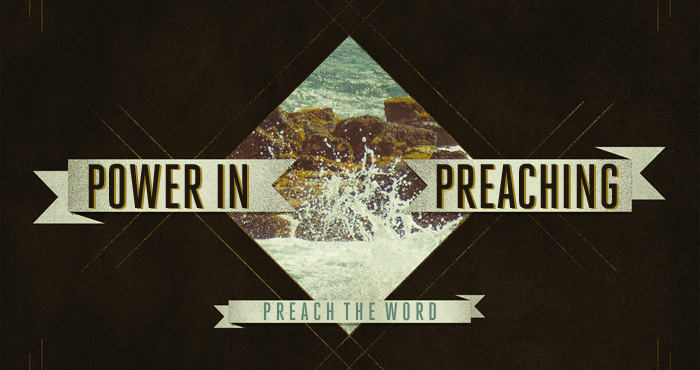I’m sure we can all remember a time when we heard God’s word preached with peculiar power. If you recall such a time, here’s my question, “What about that sermon was particularly powerful?” You see, it’s one thing to say a sermon had power and it’s another thing to know why it had power.
Understanding any powerful sermon is utterly dependent on the sovereign Spirit opening hearts, I want to think about a few ordinary conduits of sermonic power.
Like a solar panel soaks up energy, we want our sermons to soak up – to varying degrees – the power in each of these forces. In my mind there are at least four power sources in every sermon.
4 Ordinary Forces in Preaching
The preacher’s personality. Of all the forces I’m going to mention this one seems to be the most dangerous. Is it wise to build a preaching ministry on a compelling personality? I hope you’d say, “No.” Yes, any sermon is going to have undeniable elements of personality; as Phillip Brooks’ famously said, “Preaching is truth through personality.” Yet, if the forceful gales in our sermons depend on the leveraging of our personality we’ve missed something. I know some who think personality should be turned off in preaching and others who say, “Use it to the glory of God!” It seems better to treat personality as something like cilantro (or whatever ingredient you think is best). When cooking Latin fare cilantro is often needed to produce the right taste, but too much of it derails the dish. So too is it with personality in preaching.
The preacher’s rhetoric. The study of rhetoric has fallen hard in our day. A quick perusal of Twitter feeds and Facebook statuses show just how far we’ve gone. I’m not thinking here of rhetoric being synonymous with eloquence. Paul rung the death knell on sophistic eloquence in 1 Corinthians 2 when he said, “And I, when I came to you, brothers, did not come proclaiming to you the testimony of God with lofty speech or wisdom. For I decided to know nothing among you except Jesus Christ and him crucified.” If that’s what you associate with rhetoric, crucify that notion.
What I have in mind is other Pauline rhetorical realities, such as, “Therefore, knowing the fear of the Lord, we persuade others.” Or his request for the Colossians to pray “that I may make it clear, which is how I ought to speak.” Our sermons needs persuasive clarity; that’s the biblical ideal of rhetoric. We must work hard with language and logic so that our sentences burn with simplicity. We don’t want sermons that wander in their argument or come with wimpy in coherence. Wise rhetoric keeps us from babbling and can function as a springboard unto forceful preaching.
Balance all the above sentiments, however, with what else Paul said in 1 Corinthians 2, “I was with you in weakness and in fear and much trembling, and my speech and my message were not in plausible words of wisdom, but in demonstration of the Spirit and of power, so that your faith might not rest in the wisdom of men but in the power of God.”
The preacher’s godliness. Now here’s something we all need in our preaching: sermons which are the overflow of living communion with God. I can think of numerous preachers whose communion with Christ gives their sermons an unusual sense of living energy. When they ascend to the sacred desk they did so as men just come from the mountain of God. These men glow with the truth and of Jesus, and that glow radiates into their hearers. You feel as though you must listen for this is a “man of God.”
The exhortation here is to strive for that holiness without which no one will see the Lord, so our sermons will have a saltiness about them. Keeping a close watch on ourselves and the teaching will save us and our hearers. Get in the spiritual weight room and train yourself for godliness. Then, with the Spirit’s illuminating help, your sermons will really sting and sing.
The preacher’s passage. You may notice I am operating in descending order of importance. The preacher’s godliness is the irrefutable covert reality in powerful preaching. The only real overt reality in a strong sermon is the degree to which the preacher sticks to inspired Scripture. The pastor’s words are not breathed out by God (in the technical sense of inspiration), but his text is. And those words are useful for molding the congregation in Jesus’ image. Only His words are “living and active, sharper than any two-edged sword, piercing to the division of soul and of spirit, of joints and of marrow, and discerning the thoughts and intentions of the heart.” Saturate your sermon with His language more than your own.
The question then is, “How faithful is your sermon to your passage?” How you answer that question has a direct correlation to how powerful you sermon will be. Let’s long for and encourage plain preaching which clings to the supreme power of God’s word. The personality, rhetoric, and holiness of a preacher cannot – in and of themselves – do anything, not least of which is be an unquenchable source of power. But God’s word is indeed an unending power plant for preachers. Will you treat it as such?
All in Due Proportion
Use your personality wisely and humbly.
Pursue precision and concision in rhetoric ruthlessly.
Cultivate communion with God joyfully.
Root your sermon in God’s word expectantly.
And then preach with power.

